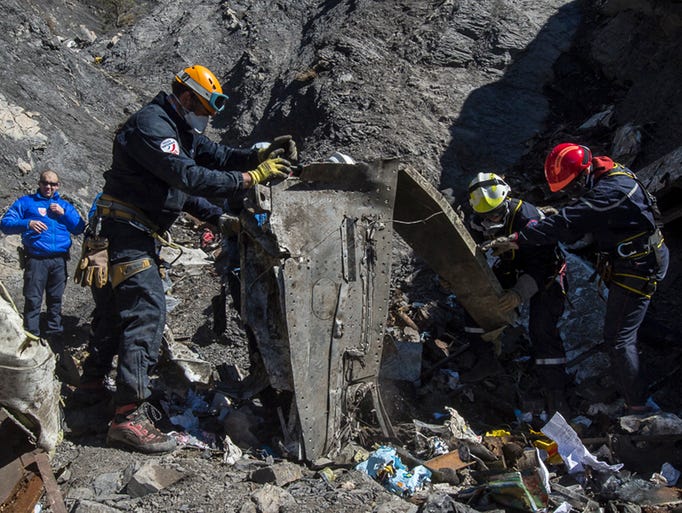The co-pilot of the Germanwings flight which crashed in the French Alps in March, practiced the crash on the same plane during an earlier flight. Wochit
The co-pilot of the Germanwings plane that slammed into the Alps appears to have practiced for the deadly descent by setting controls to dangerously low altitudes during a flight earlier that day, French investigators said Wednesday.
The revelation contained in a 30-page interim report from the French accident investigation agency BEA appeared to support the theory that the crash was deliberate and premeditated.
The Airbus 320 co-piloted by Andreas Lubitz crashed in the French Alps on March 24, killing all 150 people aboard, while on a flight to Duesseldorf, Germany, from Barcelona.
The agency said Lubitz set the plane into a descent several times during the earlier flight into Barcelona from Duesseldorf that morning. The plane's "selected altitude" changed repeatedly and several times was set as low as 100 feet above sea level.
The report said Lubitz also put the engines on idle, which gives the plane the ability to descend quickly.
On the doomed flight from Barcelona to Duesseldorf, Lubitz set a 100-foot altitude before the plane crashed into the Alps.
"Several altitude selections towards 100 ft. were recorded during descent on the flight that preceded the accident flight, while the co-pilot was alone in the cockpit," the preliminary report said.
According to the report, the resetting of automatic flight controls occurred during a four-minute period that begins after sounds picked up on the voice recorder indicate that the pilot had left the cockpit.
Aviation experts say it would be highly unusual for a pilot to repeatedly set a plane for such a low altitude for no apparent reason.
The report said Lubitz did so while air traffic controllers were asking him to bring the airplane down gradually from 35,000 feet to 21,000 feet for its descent to Barcelona.
A BEA chart showed the plane didn't actually descend sharply while Lubitz was repeatedly adjusting the settings, so the passengers and crew might not have noticed any change.
"The captain didn't realize at all, because the co-pilot's tests during the outgoing flight took place during a normal, preprogrammed descent and it never had an impact on the plane's trajectory," said Remi Jouty, the director of BEA
Because the plane was already on descent into Barcelona, the setting of 100 feet minimum would not be noticeable to air traffic control or others on the plane. Lubitz kept the plane on this trajectory for about a minute and a half, leveling off at 25,000 feet shortly before the voice recorder notes the return of the pilot.
"I can't speculate on what was happening inside his head; all I can say is that he changed this button to the minimum setting of 100 feet and he did it several times," Jouty said.
"These very brief actions on the previous flight were a sort of rehearsal of the maneuver," Jouty said.
On the flight that crashed into the Alps, only hours later, French and German prosecutors say Lubitz locked the pilot out of the cockpit and deliberately steered the plane into a ravine.
Helmut Tolksdorf, a spokesman for Lufthansa, the parent company of Germanwings, told the Associated Press that the airline had not had time to analyze the new details and planned no immediate comment.
The BEA report also showed that the Lufthansa aeromedical center twice turned down Lubitz's bid for a medical certificate re-validation in April 2009 because of depression and the medication he was taking to treat it, according to DPA, the German news agency.
When he was eventually issued a new certificate in July 2009, a note was attached specifying that he was required to undergo regular medical examinations. The limitation also required the medical examiner to contact the issuer of the license before conducting an evaluation for a medical certificate renewal.
Lubitz's most recent medical certificate was issued in July 2014 and was valid until August 2015.
"We are in a situation where the medical problem was known, was investigated and a decision was made," Jouty said.
Lubitz,who struggled with depression, had a doctor's note excusing him from flying the day of the crash, but he had hidden it and been cleared for flying by Germanwings.


0 comments :
Post a Comment